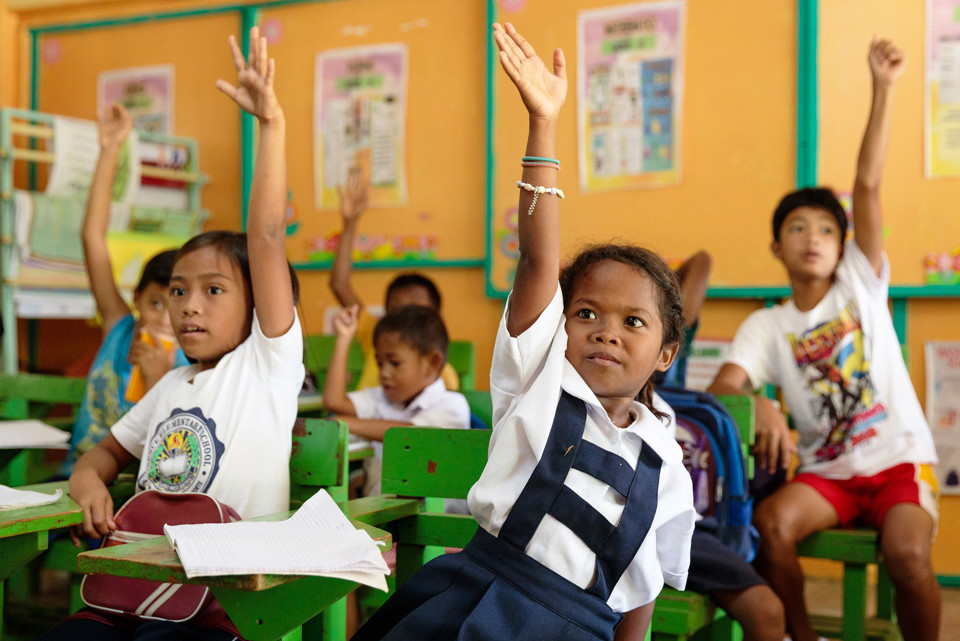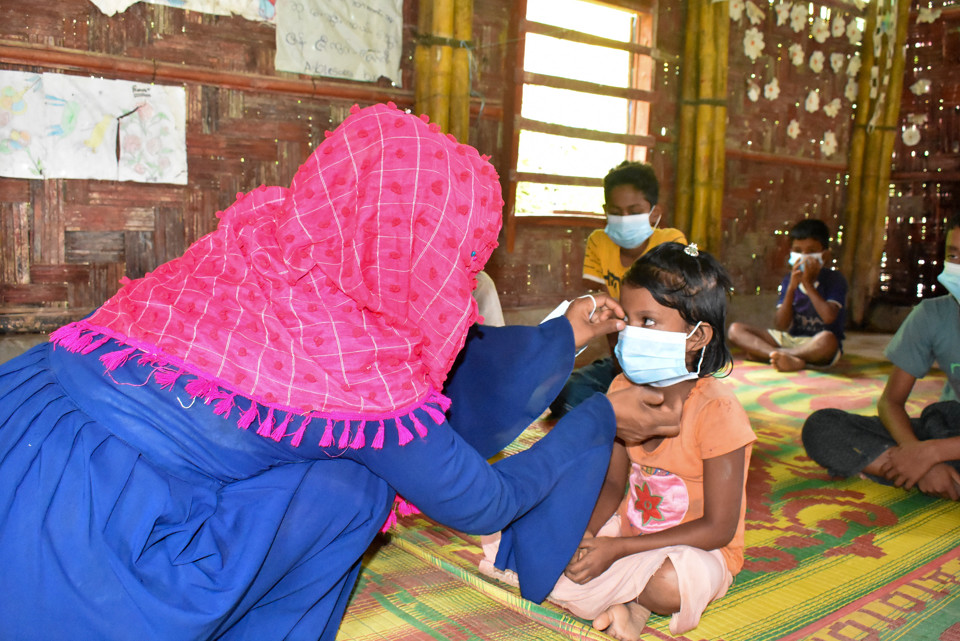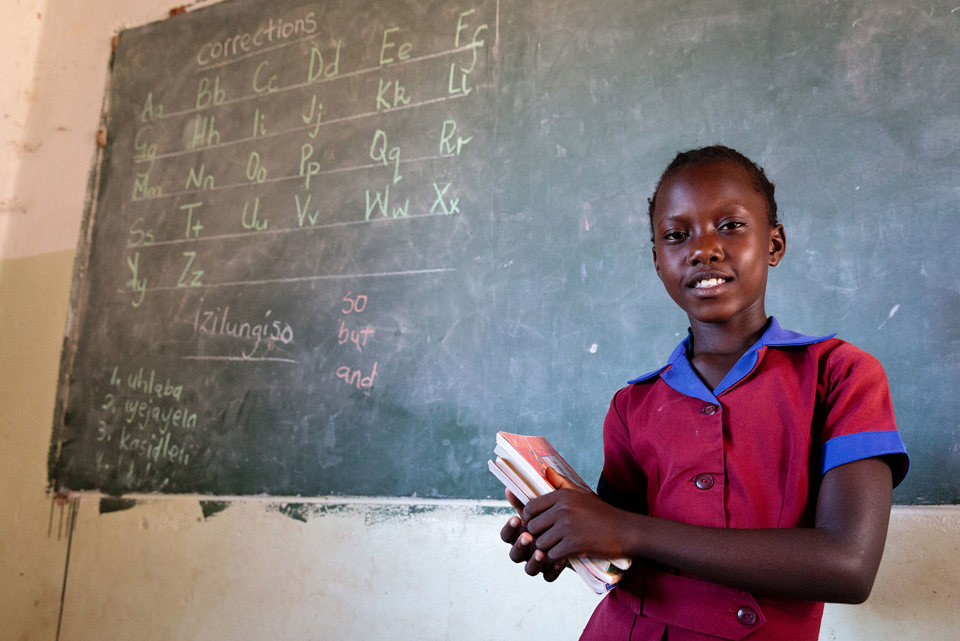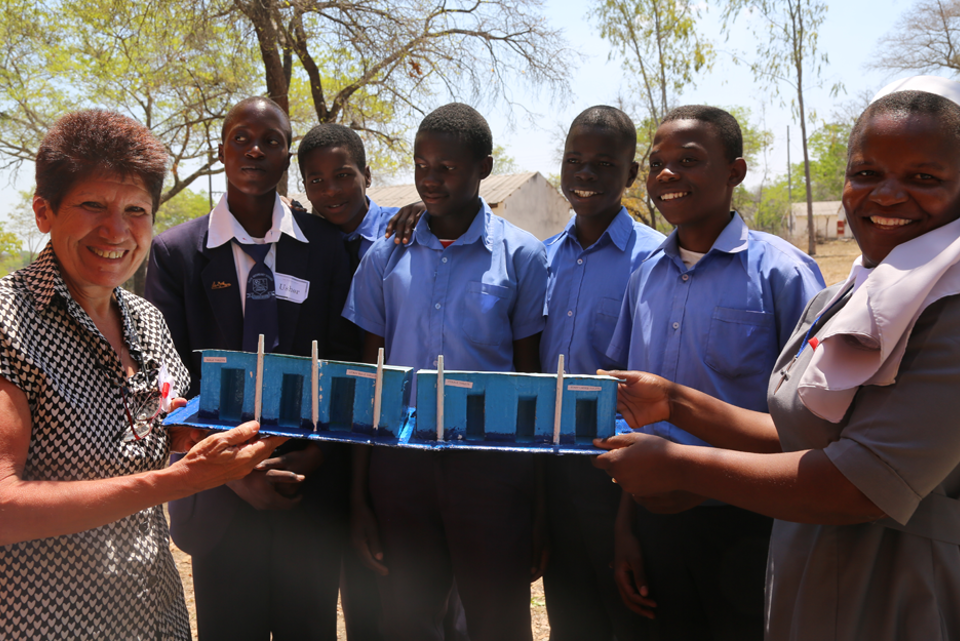Global issues
Access to education for all

Principal Ada (right) and a group of students including Toefuata’iga (centre), 13, smile to camera in a Samoan primary school class. Photo: Caritas Australia.
Why Access to Education Matters Globally
Education is a Human Right
Access to education is more than just a pathway to personal development; it is a basic human right.
Without education, children's employment and livelihoods remain limited, with significant socio-economic and health impacts.
One of the UN’s Sustainable Development Goals is to ensure that every child completes primary and secondary school by 2030. Over the past decade, significant gains have been made in improving child and adult literacy rates. Yet, over 244 million children and youth remain out of school globally, with many facing barriers linked to poverty, conflict, and discrimination.

Angel (8) is seen during lessons at her local school close to her Manide community in Camarines Norte, the Philippines, 2019. Photo credit: Richard Wainwright/Caritas Australia.
Caring for the most vulnerable in society is central to our mission. In Catholic teaching, we are called to help those in need, following the example set by Jesus Christ. Just like the Parable of the Good Samaritan, it teaches us to show compassion and take action to aid the vulnerable, regardless of their circumstances. This commitment is reflected in our programs, ensuring that every child has the opportunity to break free from poverty and lead a dignified life.
Access to education stats
200 million
An estimated 200 million children will still be out of school by 2030.
617 million
Approximately 617 million children worldwide do not have basic mathematics or literacy skills.
750 million
At least 750 million adults are illiterate – over two-thirds are women.
132 million
Over 132 million girls worldwide miss out on school.
Source: UN
Support Caritas Australia improve access education for all. Donate Now
Donate NowAddressing Global Issues in Education

Ronita and her son, Egzy Grey, in their home in the Philippines. Photo: Richard Wainwright/Caritas Australia
Gender Inequality
Gender inequality, traditional social hierarchies and cultural norms are strong barriers to girls’ education. In households with multiple children, parents may send their sons to school rather than their daughters, because they are seen as having higher wage-earning potential. Girls are instead designated domestic duties, such as collecting food and water for the family.
In many communities around the world, girls are forced to marry before they finish their education. Child marriage robs girls of the opportunity to learn the skills and knowledge they need to become financially independent. It is essential that we keep girls in school, so they are empowered to make their own life decisions. Girls who have completed their schooling are much more likely to marry at a later age, have fewer children and earn higher incomes. This in turn helps to lift disadvantaged households out of poverty.
COVID-19 has disrupted education worldwide
The COVID-19 pandemic reversed the years of progress in children’s education. The lockdown has forced many schools around the world to close.
The pandemic has also highlighted the digital divide between the rich and the poor. Remote learning was out of reach for at least 500 million students. In many disadvantaged communities, children did not have access to laptops or a strong internet connection to continue their learning during lockdowns.

Halima (left) leading a Covid-19 related health and hygiene session with children in her Rohingya refugee camp in Cox’s Bazaar region of Bangladesh in August 2020. Photo credit: Inmanuel Chayan Biswas/Caritas Bangladesh.

Lan* with her son Quan* at a community-based learning classroom in rural Vietnam for children living with disabilities. Photo: Phan Tan Lam/Caritas Australia
School teacher shortages
A lack of qualified teachers affects the quality of education, especially in remote areas. We believe local teachers should be the agents of change in their community. That’s why we must empower local teachers with the resources and training they need to run their classrooms.
In line with this commitment, we partnered with Jesuit Refugee Services to strengthen the capacity of the Kareeni education department. Together, we have worked to deliver quality education in refugee camps along the Thailand-Myanmar border, ensuring that even the most vulnerable communities have access to skilled and empowered educators.
Education transforms lives
Education is the circuit breaker that can end the cycle of intergenerational poverty. When you empower a person with education, you equip them with the knowledge and skills they need to fulfil their potential.
They can improve their employment prospects, earn more income and, most importantly, lift themselves and their family out of poverty.
Like many women in Tanzania, Oliva didn’t have the opportunity to go to school. She runs a kiosk but her business was losing money because she couldn’t count. She felt embarrassed that she couldn’t read or write.

After growing up illiterate, Oliva from Tanzania attended an Adults Learning Program run by Caritas Australia partner DMDD. She can now read, write and count and this has enabled her to run her small kiosk and restaurant more efficiently without people taking advantage of her. Photo: August Lucky/Caritas Australia
After enrolling in a Caritas Australia-supported literacy and numeracy class, Oliva gained the confidence and skills needed to manage her kiosk. Her business is now thriving, and she can help her children with their homework.
Inspired by her transformation, Oliva set up her own classroom to teach literacy and numeracy to her neighbours, free of charge. She has since become a respected community leader and plans to run for local elections.
Oliva’s story shows that empowering a woman with education can uplift an entire community.

Thandolwayo at her primary school in the Hwange district in rural Zimbabwe. Photo: Richard Wainwright/Caritas Australia

Lam is working as a freelance Graphic Designer from his home in Quang Nam, Vietnam. Photo: Caritas Australia

Toefuata’iga, a 13-year-old student in Samoa, faced educational challenges due to water scarcity. Caritas Samoa, also our partner, installed a 10,000-litre tank at her school. This has helped the school maintain regular class schedules and improved the health of its students.
Education provides individuals with the skills to secure better opportunities; without it, escaping poverty and contributing meaningfully to their communities may remain out of reach for many.
Changing Lives Through Learning
Education is the circuit breaker that can end the cycle of intergenerational poverty. When you empower a person with education, you equip them with the knowledge and skills they need to fulfill their potential. It also equips individuals with critical skills, enabling them to secure better-paying jobs and most importantly, lift themselves and their families out of poverty.
According to UNESCO, each additional year of schooling increases a person’s income by about 10%, making education one of the most effective tools for combating poverty.
“Education is the most powerful weapon which you can use to change the world.”
How Caritas Australia is Improving Global Access to Education
At Caritas Australia, we believe that education is a powerful tool to break the cycle of poverty and create lasting change in communities worldwide.
Education in the Philippines
Our local partner, the Faithful Companions of Jesus (FCJ), has made significant strides in improving access to education in the Philippines.
Ronita, a 22-year-old mother of two from Quezon City, resumed her education through the FCJ’s Alternative Learning System (ALS). After leaving school due to early pregnancy, she completed her studies, obtained a senior high school certificate, and secured employment to support her family.

Ronita (22) in class in Quezon City, Philippines. Photo: Richard Wainwright/Caritas Australia
Empowering Women in Tanzania
Like many women in Tanzania, Oliva didn’t have the opportunity to go to school. She ran a kiosk but struggled with managing her business due to her inability to count, read, or write. Embarrassed by her lack of literacy skills, Oliva felt limited in her ability to support her family.
After enrolling in a Caritas Australia-supported literacy and numeracy class, Oliva gained the confidence and skills needed to manage her kiosk. Her business is now thriving, and she can help her children with their homework.
Inspired by her transformation, Oliva set up her own classroom to teach literacy and numeracy to her neighbours, free of charge. She has since become a respected community leader and plans to run for local elections.
Oliva’s story shows that empowering a woman with education can uplift an entire community.

Olivia reads with her husband Thomas inside their home in Tanzania, Photo: August Lucky
How You Can Support Our Mission
Donate Today
Your contributions can help us provide access to education to people in need.
Become a Champion for Change
By signing up to become a Champion for Change, your monthly gifts can help transform lives today, tomorrow and every day.
Give a Global Gift
Celebrate special days with a gift that gives back.
Each card makes a difference by supporting transformative global programs.
Frequently Asked Questions
Poverty limits access to education by creating barriers such as lack of school fees, inadequate resources, and the need for children to work instead of attending school.
Caritas Australia provides infrastructure support, teacher training, scholarships, and partnering with community-driven programs to enhance education opportunities worldwide.
Barriers include poverty, gender inequality, inadequate infrastructure, teacher shortages, and lack of resources.
Education equips individuals with skills and knowledge to secure better jobs, increase their incomes, and break the cycle of poverty.
People can donate, volunteer, or advocate for policies that promote equitable access to education globally.
Yes, stories like Ronita’s in the Philippines and Oliva’s in Tanzania highlight the transformative power of education.
Donations are used to fund education initiatives such as building schools, providing teacher training, improving infrastructure, and supporting scholarships for disadvantaged students. Funds are also allocated to specific programs like vocational training and literacy classes in underprivileged communities.












